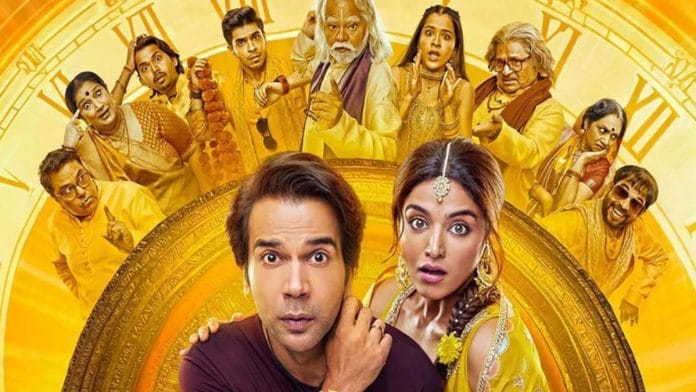New Delhi: The Bombay High Court stayed the release of Rajkummar Rao and Wamiqa Gabbi-starrer Bhool Chuk Maaf on OTT or any other platform. This comes after PVR INOX filed a case against the movie’s producer, Maddock Films.
On 8 May, Maddock Films announced the direct-to-OTT release of their film. “In light of recent events and the heightened security drills across the nation, we, at Maddock Films and Amazon MGM Studios, have decided to bring our family entertainer, Bhool Chuk Maaf, directly to your homes on May 16 only on Prime Video, worldwide,” read the statement posted across social media platforms.
PVR Inox had filed a plea in the court on 9 May, alleging a breach of contract by Maddock Films. It stated that the last-minute change was a clear breach of the contract signed on 6 May. PVR Inox also pointed out that the agreement included an 8-week window before the movie could be streamed online.The multiplex chain has also stated the action of Maddock Films will impact customer loyalty and cause monetary damages.
“That pending the hearing and final disposal of this Suit, the Respondents be restrained, whether directly or indirectly, by themselves or through any other person or persons, natural or corporate, associated with them, from releasing the Film on any platform/medium including OTT platforms in India, until expiry of the holdback period of 8 weeks from the date of first theatrical release of the Film at the Applicant’s screens,” PVR Inox had demanded in its plea.
The interim order passed by Justice Arif Doctor on 10 May has allowed this application. The court order added that PVR Inox had fulfilled its obligations by promoting the film, reserving screens, and offering tickets to its consumers, and a sudden cancellation would affect its reputation and goodwill.
Also read: Ad filmmaker with book on PM Modi announces Operation Sindoor film with AI-generated poster
Exhibitors’ rights
PVR Inox challenged Maddock Films’ submission that the release medium was changed keeping in light the current security situation in India. The counter was that the production company had not relied upon any government circular or directive. It also pointed out that all the 31 Delhi theatres where the film was to be released are fully operational. The agreement between Maddock Films and PVR Inox also included commercials and promotion of the film, which was being done.
PVR Inox had already received advanced bookings for 300 theatres across India, when the makers decided to pull the plug on the theatrical release.
The advocates for PVR Inox stated in an interim application that the move impacts exhibitors. “Unlike other stakeholders in the film value chain, such as producers and streaming platforms who have multiple avenues of monetization, exhibitors are entirely dependent on the exclusive theatrical window to recover their investments and earn returns,” it read.
The counsel for Maddock Films contended that PVR Inox has prima facie no case because it has already claimed damages in an email dated 8 May, and that the copyright of the film belongs to the production house, and it can choose to release the film wherever it wants.
The high court scheduled the matter for further hearing on 16 June and asked Maddock Films to file its reply in the meantime.
(Edited by Theres Sudeep)






